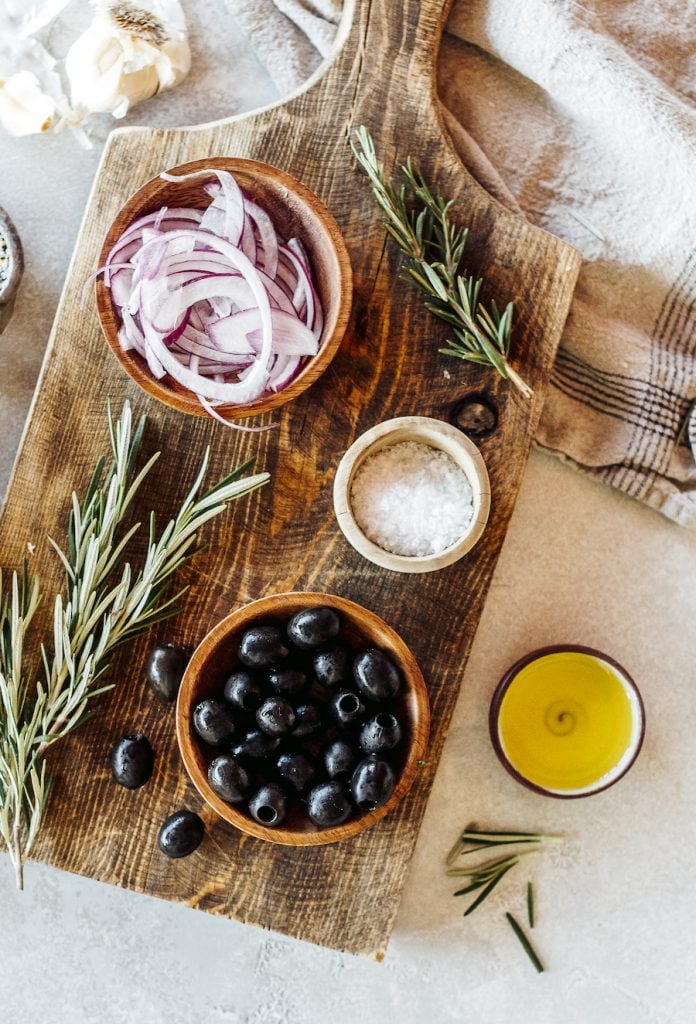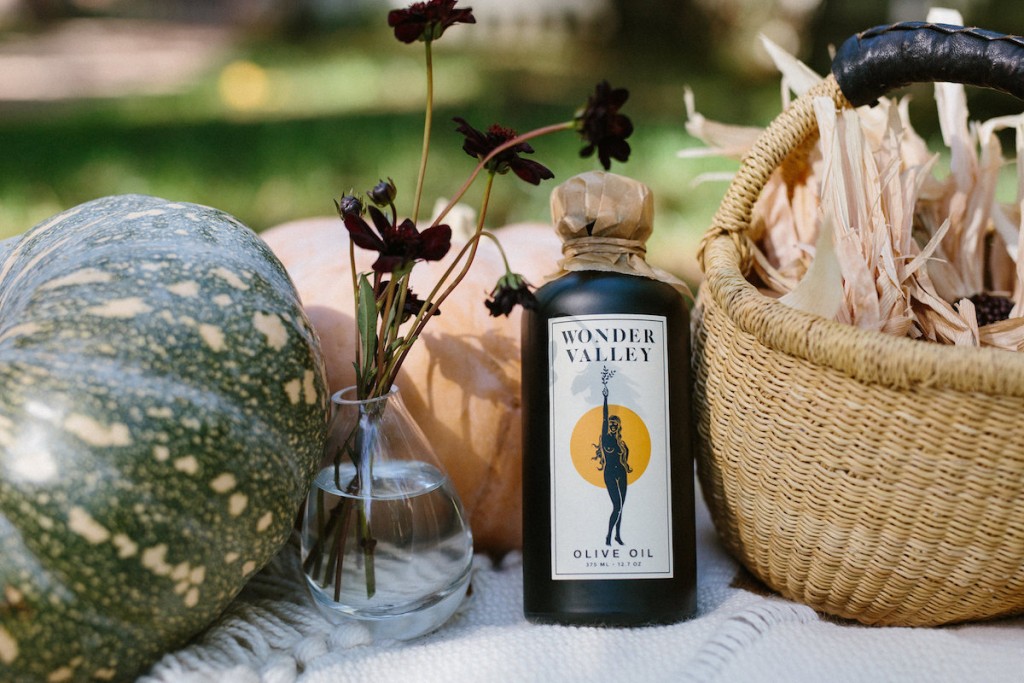Here at CS, we love our healthy fats. Citrus-y olive oil cake? Yes, please. Sunday night avocado toast? It’s always on the menu. Coconut curry red lentil soup? We’ll happily devour the entire pot. Safe to say, incorporating a variety of healthy fats is a no-brainer. After all, they’re anti-inflammatory, support hormone health, keep us satiated, balance blood sugar, and more. However, not all fats are created equal—particularly, cooking oils. Today, we’re dipping into the healthiest cooking oils, how to use them, and on the other end of the spectrum, the oils to use sparingly. If you needed an excuse to sauté your leafy greens in grass-fed butter, this is it.

Are Oils an Important Part of a Healthy Diet?
Everyone has an opinion about this, and going oil-free is becoming increasingly popular. Ultimately, this boils down to your health goals, traditions, accessibility, and beliefs. But if we consider the longest living communities on the planet, olive oil—and other healthy fats—are an integral part of their diet. At the same time, nutrition is a complex science. We are all bio-individuals. Healthy choices look different for everyone, and all foods can have their place in a diverse and balanced diet.
Most experts agree that oils are an important part of a healthy diet. They’re a key source of essential fatty acids and vitamin E, according to the USDA’s Dietary Guidelines. Mot to mention, they make food taste delicious and keep you fuller, longer. Plus, they’re necessary for the absorption of a variety of fat-soluble vitamins. Ultimately, seeds, nuts, beans, fruit, dairy, and animal fats are all naturally-derived and healthy to eat. They come from whole foods. Consider olives, avocados, and coconut. With olive oil, avocado oil, and coconut oil, they’re squeezed straight from the fruit (or the seed of the fruit). In turn, they aren’t stripped of their antioxidants and minerals.


Polyunsaturated vs. Monounsaturated Fat
All oils can vary quite a bit in the makeup of their fat content. But, the more polyunsaturated and monounsaturated fats an oil has, the healthier it’s considered. Polyunsaturated fat is found in plant and animal foods, such as salmon, vegetable oils, and some nuts and seeds. Monounsaturated fat is found in high concentrations in olives, peanuts, avocados, almonds, pecans, pumpkin seeds, and sesame seeds. Both of these types of fats are liquid at room temperature, but start to harden when chilled.


Should I Avoid Saturated Fat?
Just ask the media: They’ll tell you that saturated fats, on the other hand, are generally considered to be less healthy. In all reality, that’s up for debate. Saturated fats are found in full-fat dairy, butter, ghee, etc. Mainstream nutrition science says too much-saturated fat raises cholesterol levels in the blood, which can lead to arteries becoming blocked. In turn, this causes an increased chance of having a heart attack or stroke. However, not all scientists agree. Others argue that saturated fat isn’t the issue in heart disease. Instead? The data points to chronic inflammation. And prominent journals agree. Does this mean that every source of saturated fat is healthy? Not exactly. Instead of pounding hot dogs, consider cooking your eggs in grass-fed butter (one of the healthiest cooking oils!) and adding frozen coconut meat to your smoothies.


How Do Healthy Cooking Oils Differ?
While the healthiest cooking oils have pretty similar nutritional profiles—in terms of calorie and total fat content—they differ considerably when it comes to flavor, smell, and cooking properties. When it comes to choosing the best healthy cooking oil, it ultimately depends on what you’re making. Whether you’re baking, roasting, frying, or whisking up a vinaigrette, there’s a specific cooking oil for what you need.
How to Choose the Right Cooking Oil
Before we dive into the healthiest cooking oils, let’s talk about how to choose the right cooking oil. This comes down to what you’re concocting in the kitchen.
Flavorful vs. Neutral Oil: Many oils also impart their own distinct flavors. Sometimes, this is a desirable quality—for example, sesame oil imparts a distinctly Asian flavor to dishes. Walnut oil, virgin coconut oil, and hemp seed oil each imparts a strong, savory flavor of their own. If extra flavor will muddle the final dish’s composition, opt for a neutral oil, like safflower oil. Neutral oils also tend to have higher smoke points, making them suitable for frying.
Unrefined vs. Refined Oil: After oils are extracted or pressed, they can either be bottled immediately or refined and processed. Oils left in their natural state are labeled as unrefined, cold-pressed, raw, virgin, or unrefined. These oils tend to retain flavors, as well as beneficial nutrients. They’re best for salads or drizzling on top of finished dishes. Meanwhile, refined oils are thoroughly processed through filtering, bleaching, or heating to remove the volatile compounds that break down in virgin oils. The resulting product offers a neutral taste, long shelf life, and high smoke point.
Omega-6 vs. Omega-3 Fatty Acids: Oils high in these beneficial fatty acids include avocado oil, flaxseed oil, and extra-virgin olive oil. On the other end of the spectrum are Omega-6 fatty acids, which can cause inflammation.
Saturated vs. Unsaturated Fats: Saturated fats are commonly found in meat, cheese, butter, and many processed foods. It’s best to buy them organic and depending on your health goals, use them sparingly. Conversely, unsaturated or monounsaturated fats, commonly found in nuts and seeds, contain a variety of vitamins and minerals. The Mediterranean diet is high in unsaturated fats.
How to Store Oil
Certain elements can cause oils to oxidize and turn rancid. Like, air, heat, and light. Natural oils should smell and taste fresh and pleasant. Can’t tell? When in doubt, toss it (or in small amounts, compost it). For maintaining the quality of flavor and nutrition, it is best to store oils in an airtight glass bottle in a cool, dark place. For oils that will sit unused for longer than one month, store them in the refrigerator.


Smoke Points for Various Cooking Methods
While not common knowledge, smoke points are important to understand. Once you learn about the smoke point of various cooking oils, you’ll be equipped to choose the right oil when it comes to baking chicken, dressing your greens, etc.
First and foremost, what is a smoke point? In essence, it’s the temperature at which an oil begins to break down. Once it does, it starts to smoke. When oils break down, they can release chemicals that give food an undesirable burnt or bitter flavor. They also release free radicals, which can harm the body. Before using any oil, make sure its smoke point can handle the cooking method you plan to use. Here’s a helpful chart of smoke points (for healthy cooking oils):
| Oil | Smoke Point |
| Refined Avocado Oil | 520F |
| Refined / Light Olive Oil | 465F |
| Ghee / Clarified Butter | 450F |
| Refined Coconut Oil | 450F |
| Refined Sesame Oil | 410F |
| Beef Tallow | 400F |
| Unrefined / Virgin Avocado Oil | 375F |
| Duck Fat | 375F |
| Unrefined Sesame Oil | 350F |
| Extra-Virgin / Unrefined Coconut Oil | 350F |
| Extra-Virgin Olive Oil | 325F |
| Butter | 302F |
6 Healthiest Cooking Oils
These should be your pantry staples!
1. Avocado Oil
When opting for a neutral oil with a high smoke point, avocado is ideal. Avocado oil also has numerous health benefits, largely related to its content of antioxidants and healthy fats. This type of oil is good for heart health and has been found to reduce LDL cholesterol (without affecting HDL cholesterol). Avocado oil is also rich in carotenoid lutein which improves eye health. One small study found that adding avocado oil to a salad with carrots, lettuce, and spinach increased the absorption of carotenoids. The increase was substantial when compared with a salad without fat. Best of all, it’s super versatile. Use it as a marinade when grilling meat, use it in homemade mayo, roast vegetables in it, etc.
2. Coconut Oil
Love us some coconut oil (hello, glossy hair!). Many people praise it for its health benefits, including antimicrobial and antioxidant properties, improved skin and oral health, and weight loss potential. Researchers have found that consuming a type of saturated fat in coconut oil, called MCTs, may increase the number of calories you burn. Furthermore, MCTs provide a rapid energy source for your body to use. At any rate, coconut oil is versatile, helps control blood sugar, and has a slightly sweet taste. Roast vegetables in coconut oil or use it instead of vegetable oil when baking. Put some in your coffee! Regardless of the type of fat used in a recipe, you can swap in an equal amount of coconut oil.
3. Extra-Virgin Olive Oil
This goes without saying, but the health benefits of olive oil are unrivaled. And research continues to reveal more benefits. Olive oil is the cornerstone of the Mediterranean diet—an essential nutritional mainstay for the world’s longest-living cultures. In fact, it seems to predict higher life expectancy! Extra-virgin olive oil can work as an anti-inflammatory compound, protect against insulin resistance, reduce high blood pressure, and more. Given its lower smoke point, EVOO is best for salad dressings, vinaigrettes, and sauces, like pesto. Just be cognizant of olive oil fraud! Yes, it’s a thing. Here are some expert tips on how to buy and use olive oil.
4. Ghee
Though ghee (clarified butter) is rich in fat, it contains high concentrations of monounsaturated omega-3s. These healthful fatty acids support a healthy heart and cardiovascular system. Studies show that using ghee as a part of a balanced diet can help reduce unhealthy cholesterol levels. Plus, ghee has a long, illustrious history. Also known as “liquid gold” or “sacred fat,” ghee originated in ancient India when the domestication of cattle and the consumption of butter first began (1500 – 500 BCE). It has a high smoke point, so it can be used for baking, roasting, frying, and more. Use it for popcorn! I love it when cooking eggs, greens, as well as putting a dollop in my morning coffee.
5. Sesame Oil
Sesame oil is made from raw, pressed sesame seeds and has culinary, medicinal, and cosmetic uses. It’s rich in antioxidants, may reduce inflammation, and may reduce heart disease risk factors. With its distinct flavor, sesame oil is delicious in this cucumber salad and these soba noodles. Otherwise, drizzle it on soups or use it in a stir-fry. Keep in mind that plain sesame oil is delicately flavored and well suited for cooking. Oil made from toasted sesame seeds is much darker and is used primarily as a flavoring.
6. Walnut Oil
Walnut oil is extracted by pressing whole walnuts. It has a nutty, delicate flavor and contains some of the beneficial nutrients and compounds found in whole walnuts, including unsaturated fatty acids and polyphenols. Consuming walnut oil may improve heart health, lower blood sugar, and have anti-cancer effects. If you haven’t tried La Tourangelle’s Roasted Walnut Oil, here’s your gentle nudge. It’s my favorite. Walnut oil is easy to use in baking, vinaigrette dressings, and everyday cooking. Substitute walnut oil in your favorite brownie mix or add some magic to my healthy banana bread.
Oils to Ditch
Unlike the healthiest cooking oils, there are other oils to be wary of. Like sugar and trans fats, experts are aware of several dietary culprits that explain rapidly rising rates of chronic disease. One commonly consumed food that receives little attention? Industrial seed oils. Industrial seed oils are highly processed. They’re extracted from soybeans, corn, rapeseed (the source of canola oil), cottonseed, and safflower seeds. They represent an evolutionary mismatch (unlike olive oil, coconut oil, etc.), raise our omega-6-to-omega-3 fatty acid ratio, are unstable and oxidize easily, contain harmful additives, are derived from GMOs, and when they are repeatedly heated, they are even more toxic. Stick with healthy cooking oils, instead!






